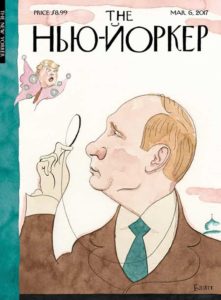 The world desperately needs our intelligence right now. It needs us to keep our wits sharp and expansive.
The world desperately needs our intelligence right now. It needs us to keep our wits sharp and expansive.
This means avoiding the conventions of groupthink that weaken and diffuse them.
Such as dualistic thinking, which cramps our intelligence like a growing child dressed in tight clothes.
Here vs. There
We’ve talked about how every domestic issue is identified in the US media in terms of this party vs. that party. At least as limiting is the way every global issue is seen as this country vs. that country.
Nationalism, so omnipresent in the public conversation as to be effectively invisible, dictates what our allegiances should be, as if life were a football game.
Cuba and Venezuela (in their refusal to be puppet states of Uncle Sam) are our traditional enemies, Israel and Saudi Arabia (despite their abominable human rights records) are our traditional friends, etc.
At its most extreme, nationalism asks that we pledge to “my country right or wrong.” This is a handy way to get off the hook, if we don’t want to tackle difficult ethical questions. The patriot template, like fundamentalist religion, presumes to answer for us some of the most  important questions of life. We’re given our values from the outside in.
important questions of life. We’re given our values from the outside in.
So we avoid the hard soul work of weighing moral questions from the inside out. Such as: How do I feel about my taxes going to pay for torture in Romania?
Other ways of seeing
In Ecuador right now, Chinese entrepreneurs are building a controversial copper mine. Seen  through the eyes of the US business leaders who call the shots in international diplomacy, such a scenario represents a threat to “US interests.”
through the eyes of the US business leaders who call the shots in international diplomacy, such a scenario represents a threat to “US interests.”
The voracious Chinese, Uncle Sam’s ascendant rivals, are the bad guys because they challenge America’s longstanding first-dibs status as regards the exploitation of Latin America.
Trump’s supporters would doubtless be right with him on this, more out of a vague sense of “America First” than because they share any of the profits the exploiters seek to gain.

But for many of us, the nationalities involved are not where the meaning lies. We see what’s happening in Ecuador as a fight between defenders of the Earth and the forces of greed.
My guess is that the native Ecuadorians don’t see this as a battle with China specifically, either; any more than their ancestors would have seen their struggles as being with the Spanish specifically, or later, with Texaco specifically.
They have learned that all colonizers are desecrators of their land.
Core issues
In this time of crumbling sureties, nationalism is quickly becoming irrelevant. One thing rendering it moot is environmental degradation. Desertification doesn’t care whether you live in Sudan or over the border in Eritrea.
Also leaching the meaning out of nationalism is global capitalism, which has created a wealth disparity so freakishly extreme that the only meaningful demographic distinction is that of the 1% vs. everybody else. Multinational corporations have long outgrown patriotism; for them, national borders exist to show them where the cheap labor is, and the flimsiest tax laws.
Nation-statehood still has meaning as a mental construct; but to see the world exclusively through that lens, in this day and age, is to skew our priorities absurdly. Such a worldview relegates to side issues the core crises we face as a planet.
 Bigger Perspective
Bigger Perspective
As with other blindspots, nationalism can be remedied by a spiritual or cosmic perspective. Art, too, can nudge us into a bigger picture.
For example, when an intelligent movie comes out that features an alien visitation, we get to imagine, for a moment, the viewpoint of a creature who is not limited by our habitual way of seeing the Earth. We put ourselves in the shoes of an outsider who’s observing a species — us — destroying its planetary home.
Such  a visitor would surely ask itself, “How is that they can count any crisis more important than this?”
a visitor would surely ask itself, “How is that they can count any crisis more important than this?”
Putin and the US election
Consider the fraught issue of Russia’s interference in the US election.
In the conventional media, the meaning of this flashpoint is being filtered through both of America’s main binary models: Democrats vs. GOP, and Washington vs.  the Kremlin.
the Kremlin.
In their condemnation of the Putin ties, Democrats have been trying to rally the troops by wrapping themselves in the flag, invoking good ol’ American Russophobia.
They’re harnessing the antipathies of an international conflict — the Cold War (not over by a long shot) — in what is more essentially a domestic conflict — between themselves and the GOP.
Except the conflict isn’t really about that, either. The civil war now raging in the USA is no longer a battle between the two establishment parties. The pollsters and pundits discovered this last November, to their shock and humiliation.
In this fast-changing, strange-bedfellows climate, the old political-party truisms are slipping into meaninglessness.
While Russia’s tampering with the election is being decried by many Americans, it is not being repudiated by “conservatives” en masse, as expected. It is being shrugged off — even condoned — by those whose party affiliation would have made such a stance unthinkable just a couple of years ago.
Cap or kitten ears
At the moment, your position on Russia is best determined by whether you’re wearing a red baseball cap or a hat with kitty ears.
Rare is the American journalist who is using this story to actually inform people. To do so would entail reminding Americans of Washington’s own history of “election tampering” (to put it mildly) in Iran, Iraq, Libya, the Congo, Indonesia, Guatemala, Cuba, Chile, Haiti, ad
 nauseum. Name a place — the CIA has been there, trying to overturn a sovereign government with a dirty war or a poisoned cigar.
nauseum. Name a place — the CIA has been there, trying to overturn a sovereign government with a dirty war or a poisoned cigar.
The Despicable One himself pointed this out, when he said “We aren’t so innocent, either” in that interview with Bill O’Reilly (a perfect example of the Trump penchant for “mixing forbidden truths with his lies,” as David Bromwich puts it).
Old power order
My question is this: What’s with all the shock about Putin’s shenanigans? Do we not already know that countries have espionage agencies, and that they use them to try to influence other countries’ governments? Must we wait for a defecting Russian, or a rogue hacker, to tell us that spies spy?
(There’s something almost quaint about the fuss, considering that we live in an age when Comcast, Verizon, AT&T et al routinely surveill each and every one of us in ways far more extensive than any national rival could ever wield. This may be too threatening to contemplate. Perhaps we prefer railing against a traditional foreign enemy — a scenario that’s in our cultural blood, from John le Carre novels.)
The truly novel thing about this case is that Putin seems not to have cared about keeping his operation covert (see The New Yorker’s analysis.) Neither should we, as conscientious citizens, want these operations to remain covert.
The lesson here is bigger than the struggles between Trump & the Democrats, and bigger than those between West & East. It is between an old world order and a new one.
During Pluto in Capricorn, all the superpowers, and the colonial-era mindset that produced them, are being exposed for what they are. We are getting a good look at a global paradigm that’s corrupt and doomed.
This must be done before a new one can emerge.
To be continued.

